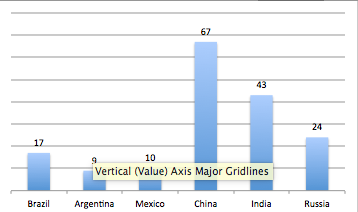Economic historians from around the world met in Kyoto from 3 to 7 of August. As a major event, it is a good thermometer on what is driving the attention of the academic community. How did Brazil do?

Taking an objective approach, we realize that Brazil leads the interest in Latin America, as it would be expected but is far behind the other BRICs. Let’s see.
Brazil was the subject of 17 papers. Comparing with other countries in Latin America, Brazil was on the top of the list. Mexico came second with 10 papers and Argentina was subject of 9. However when comparing with the BRICs, Brazil falls way behind. As it could be expected, China leads, with 67 papers. India follows with 43 and Russia with 24.
Papers talking about Brazil in comparison with other countries (Latin America and BRICs)
What period did they talk about
Most papers chose the 20th century but the interest in the 19th century was also remarkable. Subjects of this period were: slavery, sugar, the introduction of statistics science and the impact of German immigration in education.
Where did the papers come from
Another interesting stats is to see who is thinking about Brazilian economy. Of course, locals are number one, and no surprise in having the United States as a second source of articles. Brazil (8), the USA (3) and France (2) were the countries that most contributed with papers about Brazil. The University of São Paulo (4) is the leading source among all institutions, seconded by Paris Sorbonne University (2).
Origin of the papers
Summary of papers that had Brazil as a subject
| Author | University | Paper |
| Alexandre Macchione Saes | University Sao Paulo (Brazil) | Electric power and diplomacy: US-Brazil relations in the Brazilian electric sector, 1945-1954 |
| Daniel Strum | University of São Paulo (Brazil) | The Coevolution of Various Mechanisms Governing the Expansion of Commercial Agency Relations: Jews and Conversos along the sugar route revisited (Brazil, Portugal and the Netherlands, 1595–1618) |
| Sigismundo Bialoskorski | University of Sao Paulo (Brazil) | “Cooperatives organizations in Latin America economic growth: the case of Brazil” |
| Marly Kamioji | University of Sao Paulo (Brazil) | Origins of the nuclear program in Brazil |
| Irineu de Carvalho Filho | Universidade de Sao Paolo (Brazil) | Education Performance: was it all determined 100 years ago? Evidence from Sao Paolo. |
| Eustaquio Reis | IPEA (Brazil) | “Long Run Perspectives on Regional Inequalities in Brazil, 1872-2000” |
| André Villela | Fundaçao Getulio Vargas (Brazil) | Half a century of Brazilian ‘general’ economic history textbooks: An appraisal. |
| Luiz-Carlos Soares | Federal University of Rio de Janeiro (Brazil) | “Sebastiâo Ferreira Soares and the introduction of statistical science in nineteenth Century Brazil” |
| Filipa Ribeiro daSilva | University of Macau (China) | Impact of Slave Trade in the Portuguese and Brazilian Economies: an assessment |
| Hildete de Moraes Vodopives | Université Paris-Sorbonne (Paris IV) (France) | Contemporary challenges of the Brazilian dairy industry. |
| Hildete de Moraes Vodopives | Université Paris-Sorbonne (Paris IV) (France) | FDI in Brazil in the 1990s and 2000s; macro factors impacting the internationalization of Vale |
| Bruno Gabriel Witzel de Souza | Georg-August-Universität (Germany) | “Immigration and the Path-Dependence of Education: German-Speaking Immigrants, On-the-Job Skills, and Ethnic Schools in São Paulo, Brazil (1840-1920)” |
| Hiromi Shioji | Kyoto University (Japan) | The Luxury Vehicle Market in Brazil: Different Types of Development |
| Lee Alston | University of Colorado, Boulder (Sweden) | Economic Backwardness and Catching Up: Brazilian Agriculture, 1964–2014 |
| Gail Triner | Rutgers University (United States of America) | Regulatory regimes for petroleum in Brazil |
| Anne Hanley | Northern Illinois University (United States of America) | “Public finance and social investment in Brazil’s first century of independence, 1822-1930” |
| Aldo MUSACCHIO | Brandeis University – Brandeis International Business School (United States of America) | The top-management of State-owned enterprises: the case of Brazil. |
The papers can be downloaded from the website of WEHC until de end of the month.

